My interogatee today is Sam Starbuck – dreamer of dreams, spinner of stories, teller of tales short and tall. Sam’s blog, a winner in the 2010 Author Blog Awards, is so well attended that he laid on refreshments in Sam’s Café and he has pioneered a unique method of novel writing using peer group appraisal that led to the founding of Extribulum Press. He has recently published a novella by a more traditional method – The City War, part of Riptide Press’s “Warriors of Rome” series – and since Rome, Republican or Imperial, is close to my heart I decided to try and get him into my Comfy Chair.
All right there, Sam? Here we go!
~~~
 Elin: The City War is about one of the best known incidents in historical Rome. What inspired you to retell it?
Elin: The City War is about one of the best known incidents in historical Rome. What inspired you to retell it?
Sam: It’s always easier to retell a historical story when everyone knows a little bit about it. But because everyone knows a little, and very few people know a lot, it’s also really fun and interesting to tweak it slightly — to say “This is how it could have been” and make people look at the story differently. I like taking stories that everyone knows and turning them on their head — you see it done a lot with fairy tales in popular media these days. And at this point the story of Julius Caesar’s assassination is almost fiction anyway; it did happen, but most of us know it from pop culture references or Shakespeare.
Elin: You have been publishing successfully with your own set up Extribulum. What prompted you to go down the more traditional route with The City War? Did you find the process very different?
Sam: I have to admit that I didn’t have The City War written and ready and just decided to send it to a press. I was linked by a friend to Riptide Press’s call for stories of Ancient Rome, and noticed that the Warriors of Rome collection only had thirty days left before the submission deadline. I wanted to adapt an idea I’d had about Cassius and Brutus being lovers, because while Caesar is interesting from a military and a tactical standpoint, I’ve always felt that there was more potential for interpersonal exploration with the men who killed him. It seemed like the perfect time to actually sit down and write the story, and I liked the challenge of writing it in a month. I’m a fast writer and fortunately the novella word-count limit was within my capacity.
The process is different mostly once you’ve got the first draft in, and mostly it was different in my head. With independent publishing I really only answered to myself and the readers, but with small-press publishing you have people depending on you, you have deadlines that matter because if you don’t meet them someone else has more work to do. There’s more pressure, though that’s not necessarily a bad thing when you’re a procrastinator like me.
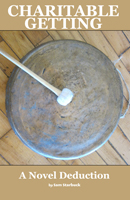
It’s still about the story — rewriting for clarity, making sure there are no typos or continuity mistakes — but you have a group of people who are specifically dedicated to helping you out, which does take some weight off your shoulders. And once the final draft was in, I was done; no typesetting, no coding, I could just take a breath and wait for the finished product. For some that might be nervewracking but for me, giving up control of that part gave me some time to process and come down from the excitement of the writing.
Elin: I know one author who can’t write without copious amounts of Diet Coke and another whose first priority is to establish her characters’ playlists. Do you have any writerly habits, without which you find the composing process difficult?
Sam: I don’t think I have as many habits as others do. For a long time, writing was something I had to do on the fly — when I had no students during office hours as a grad student, when I had nothing to do at the desk during my first job, and now on lunch breaks and after work. I had to get used to working in a variety of environments and frequently in public.
I think the only thing I really have trouble with is noise — the ambient office noise around me doesn’t bother me, but I can’t listen to music or spoken word audio while I write. I find the words too distracting.
Elin: This is a horrible question to ask but here goes – where do your ideas come from?
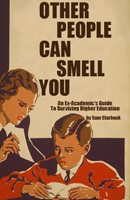
Sam: Ideas come from all over, really. Sometimes it’s a situation you’d like to see someone put into, or a situation you’ve experienced in real life; sometimes I see photographs and wonder about the people in them, or news articles, or stuff on the television. A lot of writers will say that there’s no way to explain how they get their ideas, but I know mine mostly come from the world around me, and the more I interact with that world, the more ideas I have. The City War definitely came from history, and I am a Classics nerd so I have read the original life of Caesar and the life of Brutus, but also from seeing Brutus played sympathetically in a production of the Shakespeare play, and wondering why such a moral man chose to throw in with a slightly shady character like Cassius.
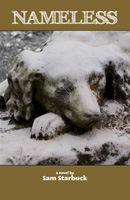
Elin: The City War is historical. Trace and Nameless are contemporary with a little twist of paranormal. You have also written Other People Can smell You a college survival guide. Is there any other genre that you are eager to try? Any you wouldn’t touch with the longest sharp stick?
Sam: When I was a younger writer I used to really like moving around between genres and even media — prose to screenplays to poetry, and stories from all over the place. I’ve settled down a bit and generally I write either contemporary lit or magical realism, but I wouldn’t mind trying more science fiction if I could come up with a plot I felt hadn’t already been done. I admit science is not my strong suit, though, so I’m a bit wary of scifi as a writer. I like it as a consumer.
I think really one of the few genres I haven’t done much with is the murder mystery, because in all honesty I’m terrible at mysteries. I like reading them, at least some of them — the old classics from the twenties through the fifties are often my favorite — but I don’t have the kind of tricky brain I think it takes to write them. Plus they usually have a large cast of characters, and the more characters I have to track, the more scatterbrained I become.
So…there’s nothing I’d never go near out of sheer dislike, but I’ve reached a point where I know what I do well, and I choose to avoid what I do badly.
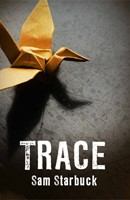
Elin: So what next? Are you working on anything now? Can you tell us about it or do you prefer to keep stories under wraps until they are finished?
Sam: Oh, I don’t mind talking about stuff, but sometimes I never finish it, so it’s always a toss-up. For Riptide, I’m looking at writing a piece set during the second world war, about the Monuments Men who ran around Europe trying to rescue precious artworks from the ravages of war. In terms of other work, I’m a little adrift right now; the holidays always make it harder to focus. But I always have a few things in the pipeline, which leads us to…
Elin: Could we please have an excerpt of something?
Sam: Absolutely! This is a short clip from the opening of Pirate Country, a sequel to my novel The Dead Isle.
***
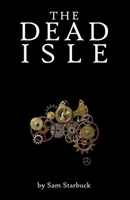
The new airshipyard of Australia, housed in a dusty field just south of Canberra, was bustling in the late morning light. Shipbuilders recruited from the ports at Sydney were at work on boats and engines, metal and wood creaking. In the great shady balloon house the clack of sewing machines could be heard, and cries of greeting as an automobile laden with Chinese silk from the trade ships to Asia pulled up to the loading door. The sun turned everything golden, sawdust dancing in the air.
Jack Baker shaded his eyes from the roof of the chemistry building, balancing precariously on the central beam, studying the airshipyard critically.
“Saying goodbye?” Murra asked, head and shoulders emerging from the window below the roof. Jack, his sun-bleached hair ruffling in the wind, looked down and smiled.
“Just watching it all go,” he replied, settling the wide-brimmed bush ranger’s hat back on his head. “It’ll run fine without me. Practically already is.”
“Bet you wish you were down there elbows-deep in the guts of an engine,” she said.
“Maybe.”
“Come inside, Jack, the train’s leaving soon.”
Jack grasped the angled flagpole at the edge of the building, sliding down it deftly; she obligingly backed away from the window so he could swing inside, boots-first. The staff, engaged in the delicate process of making and bottling helium, were used to his habit of coming in through windows and didn’t even look up as he descended the staircase, Murra a step ahead.
“How long until the first ships take sky?” she asked, as they walked through the yard towards the gate, where the afternoon train could run them back to Canberra. Jack had a Harrison, a gift from the automobile-maker, but Murra’s brother Memory had asked to borrow it that morning for some errand or other.
“Two weeks, maybe three.”
“Sure you don’t want to stick around, be certain nothing goes wrong?” she asked.
He smiled. “I’d like to, but it’s well in hand. Purva’s ready to go, and I’m afraid she’ll hijack the ship and go without me if I stall.”
“And you miss the air.”
“More than anything,” he said wistfully, turning his head up to the sky. “I didn’t know I could miss flying so much.”
***
 The City War
The City War
By Sam Starbuck
Senator Marcus Brutus has spent his life serving Rome, but it’s difficult to be a patriot when the Republic, barely recovered from a civil war, is under threat by its own leader. Brutus’s one retreat is his country home, where he steals a few precious days now and then with Cassius, his brother-in-law and fellow soldier—and the one he loves above all others. But the sickness at the heart of Rome is spreading, and even Brutus’s nights with Cassius can’t erase the knowledge that Gaius Julius Caesar is slowly becoming a tyrant.
Cassius fears both Caesar’s intentions and Brutus’s interest in Tiresias, the villa’s newest servant. Tiresias claims to be the orphaned son of a minor noble, but his secrets run deeper, and only Brutus knows them all. Cassius, intent on protecting the Republic and his claim to Brutus, proposes a dangerous conspiracy to assassinate Caesar. After all, if Brutus—loved and respected by all—supports it, it’s not murder, just politics.
Now Brutus must return to Rome and choose: not only between Cassius and Tiresias, but between preserving the fragile status quo of Rome and killing a man who would be emperor.
The City War is part of Riptide’s ‘Warriors of Rome’ collection and may be obtained here.
If you would like to follow Sam his blog is here and he is on Twitter as @ouija_sam
Filed under: author interviews |









I have The City War, but haven’t read it yet. Sorry, trying to get back on track after holidays. I am looking forward to it.
I think you’ll enjoy it. I certainly did. 🙂